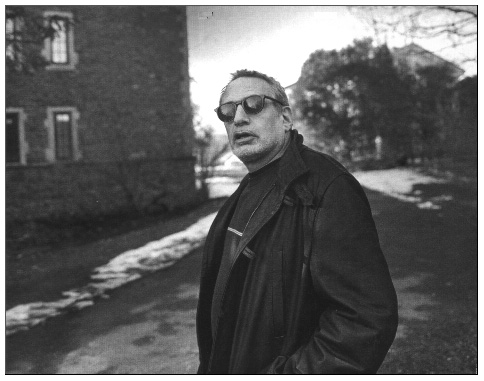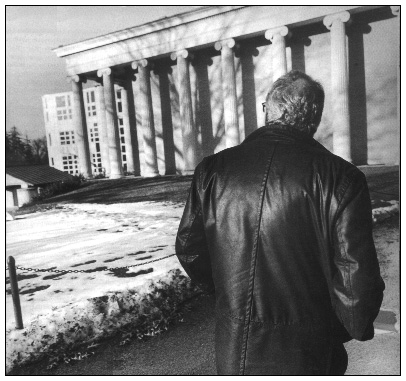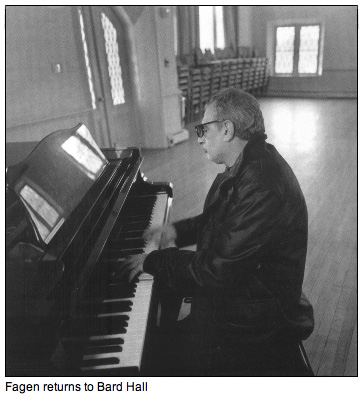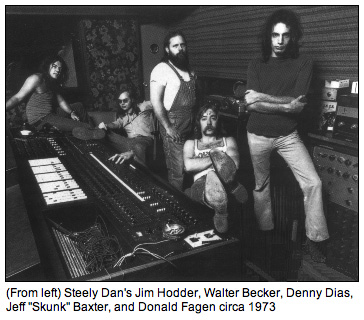![]()
| Donald Fagen: Back To Annandale |
|
![]()
More than 30 years after famously blowing off his old school, Steely Dan's
Donald Fagen returns to campus and revisits the origins of his old grudge.
by Rob Brunner in Entertainment Weekly

![]() n Halloween 1967, a party is raging inside Ward Manor, an Elizabethan-style mansion-turned-dorm at Bard College, in Annandale-on-Hudson, N.Y. On a small stage set up in the corner of the common room, a band called the Leather Canary tears through the Rolling Stones' "Dandelion," Moby Grape's "Hey Grandma," and Willie Dixon's "Spoonful," along with a few recently penned originals. It's a typical late-'60's student shindig -- most of the audience is tripping on acid -- but it's hardly an ordinary band. Behind the drums is Chevy Chase, familiar around campus as a gifted musician and good-natured goofball who's been known to drop his pants after losing late-night games of "dare" poker. Just in front of him is a long-haired muso named Walter Becker, one of the school's most accomplished guitarists. And the shy singer behind the electric piano? That's Don Fagen, decked out in a leather jacket with feathers attached to it (hence the band's name). Just a few years later, Chase will find fame as one of the greatest comedians of his generation. Fagen and Becker, meanwhile, will evolve into Steely Dan, score huge hits with songs like "Rikki Don't Lose That Number" and "Reelin' in the Years," and create several of the most beloved and enduring albums of the 1970s. And in 1973, on their second LP Countdown To Ecstasy, they will record "My Old School," an angry kiss-off that, for reasons that have never been entirely clear, takes a very public swipe at Bard. "California tumbles into the sea/ That'll be the day I go back to Annandale," Fagen famously sings. "I'm never going back to my old school." You can practically hear him sneer.
n Halloween 1967, a party is raging inside Ward Manor, an Elizabethan-style mansion-turned-dorm at Bard College, in Annandale-on-Hudson, N.Y. On a small stage set up in the corner of the common room, a band called the Leather Canary tears through the Rolling Stones' "Dandelion," Moby Grape's "Hey Grandma," and Willie Dixon's "Spoonful," along with a few recently penned originals. It's a typical late-'60's student shindig -- most of the audience is tripping on acid -- but it's hardly an ordinary band. Behind the drums is Chevy Chase, familiar around campus as a gifted musician and good-natured goofball who's been known to drop his pants after losing late-night games of "dare" poker. Just in front of him is a long-haired muso named Walter Becker, one of the school's most accomplished guitarists. And the shy singer behind the electric piano? That's Don Fagen, decked out in a leather jacket with feathers attached to it (hence the band's name). Just a few years later, Chase will find fame as one of the greatest comedians of his generation. Fagen and Becker, meanwhile, will evolve into Steely Dan, score huge hits with songs like "Rikki Don't Lose That Number" and "Reelin' in the Years," and create several of the most beloved and enduring albums of the 1970s. And in 1973, on their second LP Countdown To Ecstasy, they will record "My Old School," an angry kiss-off that, for reasons that have never been entirely clear, takes a very public swipe at Bard. "California tumbles into the sea/ That'll be the day I go back to Annandale," Fagen famously sings. "I'm never going back to my old school." You can practically hear him sneer.
![]() lmost four decades after that Halloween gig, Donald Fagen is back at Ward Manor, gazing around the very same common room. In many ways, this quiet lounge -- its ornate wood-paneled walls and elaborately plastered ceiling unchanged after all these years -- is where Steely Dan sputtered to life. Fagen and Becker both lived here, and they wrote their first, now-forgotten songs together on an old piano that disappeared from the corner years ago. But despite this room's heavy history, Fagen, exploring the dorm's dark halls for the first time since college, seems a bit underwhelmed. "Looks pretty much the same way I remembered it," he says with a shrug.
lmost four decades after that Halloween gig, Donald Fagen is back at Ward Manor, gazing around the very same common room. In many ways, this quiet lounge -- its ornate wood-paneled walls and elaborately plastered ceiling unchanged after all these years -- is where Steely Dan sputtered to life. Fagen and Becker both lived here, and they wrote their first, now-forgotten songs together on an old piano that disappeared from the corner years ago. But despite this room's heavy history, Fagen, exploring the dorm's dark halls for the first time since college, seems a bit underwhelmed. "Looks pretty much the same way I remembered it," he says with a shrug.
If Fagen is reluctant to reminisce about beginnings, perhaps it's because these days he's more interested in how things end. His new album, Morph the Cat, is a typically wry and unflinching look at death. "I was just 58 the other day," he says, sitting down at a table only a few feet from where the Leather Canary performed. "You start to realize that you don't have that much time left. And also my mother died in 2003, which was a big shock to me. So it's something I've been thinking of."
Morph is the third in a semiautobiographical trilogy following 1982's The Nightfly, a look at his youth in New Jersey, and 1993's Kamakiriad, a surreal take on his middle years. On this latest installment, Fagen taps into the undercurrent of fear that's defined life in New York City after 9/11, weaving dirty bombs and burning buildings, airport security and authoritarian governments into deceptively upbeat-sounding tunes about a variety of tragic situations. Though most of the new CD's songs aren't overtly personal, some are based on fact, including the disc's most direct take on mortality, "Brite Nightgown." "I was mugged on the Upper East Side," says Fagen. "I was almost sure I was going to buy it there. Two huge dudes sat me down and said, 'Give us all your money, we've got a gun.' They took the cash and booked. I sat there for a few minutes. Then I started to shake."

![]() hen Fagen arrived at Bard back in 1965, he was shy and bookish, a kid from the Jersey burbs who smoked a bit of pot and played a lot of piano. "Don sort of looked like a crow most of the time," says Chevy Chase. "He'd walk around with this beak of a nose and he always wore black clothing and looked down with his hands in his pockets. People thought he was kind of weird and quiet. They didn't realize that he was really intelligent, a very funny, bright guy." A fan of bebop and Beat poetry, Fagen quickly fell in with a Bohemian crowd. "He hung out with some bizarre Bard students who were too dark and mysterious for some other people," says Terence Boylan, a friend and musical collaborator at Bard. "They never came out of their room, they stayed up all night. They looked like ghosts -- black turtlenecks and skin so white that it looked like yogurt. Absolutely no activity, chain-smoking Lucky Strikes and dope. [Fagen was] immersed in an entirely Beat attitude. Very hip, very chip-on-the-shoulder, very jazz, very hatdown-over-the-eyes, saying, 'Hey, man, that's not cooool.'"
hen Fagen arrived at Bard back in 1965, he was shy and bookish, a kid from the Jersey burbs who smoked a bit of pot and played a lot of piano. "Don sort of looked like a crow most of the time," says Chevy Chase. "He'd walk around with this beak of a nose and he always wore black clothing and looked down with his hands in his pockets. People thought he was kind of weird and quiet. They didn't realize that he was really intelligent, a very funny, bright guy." A fan of bebop and Beat poetry, Fagen quickly fell in with a Bohemian crowd. "He hung out with some bizarre Bard students who were too dark and mysterious for some other people," says Terence Boylan, a friend and musical collaborator at Bard. "They never came out of their room, they stayed up all night. They looked like ghosts -- black turtlenecks and skin so white that it looked like yogurt. Absolutely no activity, chain-smoking Lucky Strikes and dope. [Fagen was] immersed in an entirely Beat attitude. Very hip, very chip-on-the-shoulder, very jazz, very hatdown-over-the-eyes, saying, 'Hey, man, that's not cooool.'"
Today, as Fagen wanders around Bard, that lost world starts to come back. He stops in front of Stone Row, a series of Gothic-style buildings at the center of campus. Here is Fagen's freshman dorm, Potter, where he lived next to Lonnie Yongue, the leader of that boho Bard scene. Yongue would later show up in the 1973 Steely Dan tune "The Boston Rag" as a "kingpin" who goes on a two-day drug bender. "Lonnie was king of Potter, that's for sure," says Fagen, gazing up at the imposing stone structure.
Bard was -- and still is -- an intensely creative environment, and Fagen soon found his way into regular jam sessions, which popped up all over campus. In Sottery Hall, Chevy Chase might be playing "bad jazz" with his singer girlfriend, Blythe Danner, while in a little practice room called Bard Hall, Fagen and Boylan might be rehearsing a 10-piece wall-of-sound version of "Like a Rolling Stone" for a class project. Fagen was already an accomplished pianist, and he started playing in a series of semi-serious and short-lived jazz and rock groups. At first, nothing really clicked. "One of the problems in those days was finding a guitar player," he says. "There were a few guitarists at school, but most still sounded like they were Dick Dale or one of the Ventures. They hadn't quite figured out how to play blues. They sounded sort of amateurish." One day in 1967, Fagen happened by a long-gone campus coffee shop, the Red Balloon. "I hear this guy practicing, and it sounded very professional and contemporary," he says. "It sounded like, you know, like a black person, really. And that was Walter. I walked in and introduced myself to him. I just said, 'Do you want to be in a band?'"
![]() agen and Becker quietly forged the intimate collaborative relationship that would eventually form the core of Steely Dan. "We had a lot of common musical background," says Becker. "Donald and I had listened to the same jazz radio stations, we had all the same records, and there weren't that many jazz fans around at that time in our particular age group. Making rock & roll that was more sophisticated harmonically and more jazzlike was something that we had a common interest in." While at Bard, Fagen and Becker started concocting the distinctive jazz-rock sound that they've pursued over the course of nine studio albums together, including two recent comeback discs (2000's Two Against Nature, which won an Album of the Year Grammy, and 2003's Everything Must Go). Their trademark groove has evolved over the years, but it hasn't really changed much. Predictably, Morph the Cat sounds exactly like a Steely Dan record. "On the one hand, it's not like I think it's any huge departure," says Fagen. "I'm not that interested in revolutionizing music. But it happened the right way. I did the tracks in 10 days and that was it. It just worked."
agen and Becker quietly forged the intimate collaborative relationship that would eventually form the core of Steely Dan. "We had a lot of common musical background," says Becker. "Donald and I had listened to the same jazz radio stations, we had all the same records, and there weren't that many jazz fans around at that time in our particular age group. Making rock & roll that was more sophisticated harmonically and more jazzlike was something that we had a common interest in." While at Bard, Fagen and Becker started concocting the distinctive jazz-rock sound that they've pursued over the course of nine studio albums together, including two recent comeback discs (2000's Two Against Nature, which won an Album of the Year Grammy, and 2003's Everything Must Go). Their trademark groove has evolved over the years, but it hasn't really changed much. Predictably, Morph the Cat sounds exactly like a Steely Dan record. "On the one hand, it's not like I think it's any huge departure," says Fagen. "I'm not that interested in revolutionizing music. But it happened the right way. I did the tracks in 10 days and that was it. It just worked."
"MY OLD SCHOOL" "RIKKI DON'T LOSE THAT NUMBER" "BLACK FRIDAY" "DEACON BLUES" "HEY NINETEEN" "ANY MAJOR DUDE WILL TELL YOU" "EVERYONE'S GONE TO THE MOVIES" "THE ROYAL SCAM" "WEST OF HOLLYWOOD" "PIXELEEN" - Chris Willman |
These days, Becker lives in Hawaii much of the time, and the two chat only sporadically. In fact, Fagen isn't even sure if Becker has heard his new work. "It's the kind of thing that we don't talk much about, actually," says Fagen. "I would be interested, but... When I was halfway through, he said, 'How's your album coming?' I said, 'Oh, it's the usual s---.' That's the only conversation we ever had about it."

![]() ucked into the woods behind Stone Row, down a narrow path many students never notice, sits a one-room, octagonal stone structure known as the Observatory. It is there that Fagen most wants to visit. "I used to practice here," he explains, gazing around the room, which, it turns out, was converted into an office in the early '70s. This isolated space was one of Fagen's most cherished escapes. "There was nothing in there but a grand piano," he says. "I had wonderful hours in here practicing scales, things that no one else should hear, you know? I'd write tunes in here, too. And if you were rejected by someone you were in love with, you could scream. I was always in love with someone [who] ignored me completely. That was my Bard experience. There was a Sorrows of Young Werther vibe about it."
ucked into the woods behind Stone Row, down a narrow path many students never notice, sits a one-room, octagonal stone structure known as the Observatory. It is there that Fagen most wants to visit. "I used to practice here," he explains, gazing around the room, which, it turns out, was converted into an office in the early '70s. This isolated space was one of Fagen's most cherished escapes. "There was nothing in there but a grand piano," he says. "I had wonderful hours in here practicing scales, things that no one else should hear, you know? I'd write tunes in here, too. And if you were rejected by someone you were in love with, you could scream. I was always in love with someone [who] ignored me completely. That was my Bard experience. There was a Sorrows of Young Werther vibe about it."
One such unrequited crush might have been a professor's young wife named Rikki Ducornet, whose first name will be familiar to Steely Dan fans. Fagen won't admit it -- he's always been extremely reluctant to explain his songs -- but it's easy to imagine that Ducornet was the inspiration for one of his band's most famous tunes, "Rikki Don't Lose That Number." "I remember we had a great conversation and he did suggest I call him, which never happened," says Ducornet, now a well-regarded novelist and artist. "But I know he thought I was cute. And I was cute," she laughs. "I was very tempted to call him, but I thought it might be a bit risky. I was very enchanted with him and with the music. It was so evident from the get-go that he was wildly talented. Being a young faculty wife and, I believe, pregnant at the time, I behaved myself, let's say. Years later, I walked into a record store and heard his voice and thought, 'That's Fagen. And that's my name!'"
Fagen would have better luck with a former Bard student named Libby Titus, whom he encountered on campus in 1966 and married 27 years later. And that's hardly his only happy memory of the school. "I was coming straight from a housing development in New Jersey, so it was great," he says. "I loved the teachers and the girls, you know. I had friends here. Probably the only time in my life," he says with a laugh, "that I actually had friends."
![]() o why, if Fagen harbors such fond memories of his alma mater, did he and Becker pen the nasty "My Old School"?
o why, if Fagen harbors such fond memories of his alma mater, did he and Becker pen the nasty "My Old School"?
Later on the Bard tour, an answer finally starts to emerge. On the edge of campus sits the small mid-19th-century house that used to be Adolph's, the school's most legendary hangout. In the late '60s, you never knew who'd show up in this out-of-the-way bar. A pair of Rolling Stones might drop in, or Bob Dylan and Bobby Neuwirth, who would come over from Woodstock. "Bard was a very hip place," says Boylan, who used to let Dylan crash in his dorm room. Across the street from the former Adolph's still sits a now-famous pump, which to this day doesn't work because, as Dylan noted in "Subterranean Homesick Blues," "the vandals took the handles." "It was a rocking bar," says Fagen, climbing the stairs to the front porch. "The girls really danced in those days." He walks into the entryway of the building, now converted into Bard offices. There's little evidence of its former life as the coolest joint in Dutchess County. "There's no reason to go any further," he says after taking a quick glance around.
 But just outside of Adolph's, he sees it. The house. "Right there is the house I was busted in," he says, gesturing toward a two-story structure nearby. Here, finally, lies the story behind "My Old School." It was around 5 a.m., a Thursday in May 1969, when a swarm of sheriff's deputies descended on Bard, sweeping through dorms and off-campus residences, including this small house, where Fagen lived with a roommate. "They went up and down the halls, knocking on doors," says Boylan, who was in his room at Ward Manor at the time. "Toilets were flushing everywhere to get rid of any pot that you had. I threw mine out the window. All you had to do was say to the cop, 'What are you doing?' They'd say, 'That's it, resisting arrest.' Somebody would say, 'What the hell is going on?' 'Oh, profanity! Arrest him.'" Fagen, Becker, and Fagen's girlfriend, Dorothy White, were all dragged off to jail.
But just outside of Adolph's, he sees it. The house. "Right there is the house I was busted in," he says, gesturing toward a two-story structure nearby. Here, finally, lies the story behind "My Old School." It was around 5 a.m., a Thursday in May 1969, when a swarm of sheriff's deputies descended on Bard, sweeping through dorms and off-campus residences, including this small house, where Fagen lived with a roommate. "They went up and down the halls, knocking on doors," says Boylan, who was in his room at Ward Manor at the time. "Toilets were flushing everywhere to get rid of any pot that you had. I threw mine out the window. All you had to do was say to the cop, 'What are you doing?' They'd say, 'That's it, resisting arrest.' Somebody would say, 'What the hell is going on?' 'Oh, profanity! Arrest him.'" Fagen, Becker, and Fagen's girlfriend, Dorothy White, were all dragged off to jail.
"These were the days when there was a 'war on longhairs,' as they used to call it," says Fagen, "and Bard's in this kind of rural district. They picked up about 50 kids just at random. There were a few warrants, and one was for me, which was based totally on false testimony. They handcuffed our hands behind our backs and put us in a paddy wagon and took us off to the Dutchess County Jail. They took all of the boys, about 35 of us, mostly with really long hair, and shaved our heads. I remember some of them were crying. I don't think any of them had seen their head for three or four years. It didn't make that much difference to me. But it was scary, you know? To hear the cell-block door slam shut, the whole business with the handcuffs and the paddy wagon. I'd never been arrested or put in jail before."
Bard hired a lawyer and bailed out the 50 or so students who'd been hauled in during the raid. Problem was, Becker and White weren't technically students at the time. "I asked them to bail my girlfriend out," says Fagen. "She had nothing to do with this and was just visiting me. And they refused to do it. So when graduation time came I protested by not going. My case had already been dismissed -- they had withdrawn the charges, actually. So I was sitting on a bench in front of Stone Row with my father and lawyer, just watching the graduation. A lot of students were also angry because apparently the school had let an undercover policeman be planted in the building and grounds department. Their cooperation with the investigation was despicable."
Four years later, Fagen and Becker released "My Old School." While Fagen says the song is "not literal" (and Becker insists he "never thought of it as an angry-sounding song; I think of it as a funny song"), he acknowledges that there was real fury behind the "never going back" chorus. "I don't know how serious we were [about never returning]," he says, "but at the time both of us were very pissed off at the school, that's for sure." Fagen kept his promise for 16 years. Then, in 1985, he returned to campus for the first time, to accept an honorary doctorate. What finally made him relent and go back to Annandale? He thinks for a moment, as if pondering the question for the very first time. "Well, you know. I'm not one to hold a grudge." ![]()
![]() Reader's Comments
Reader's Comments
No comments so far, be the first to comment.
